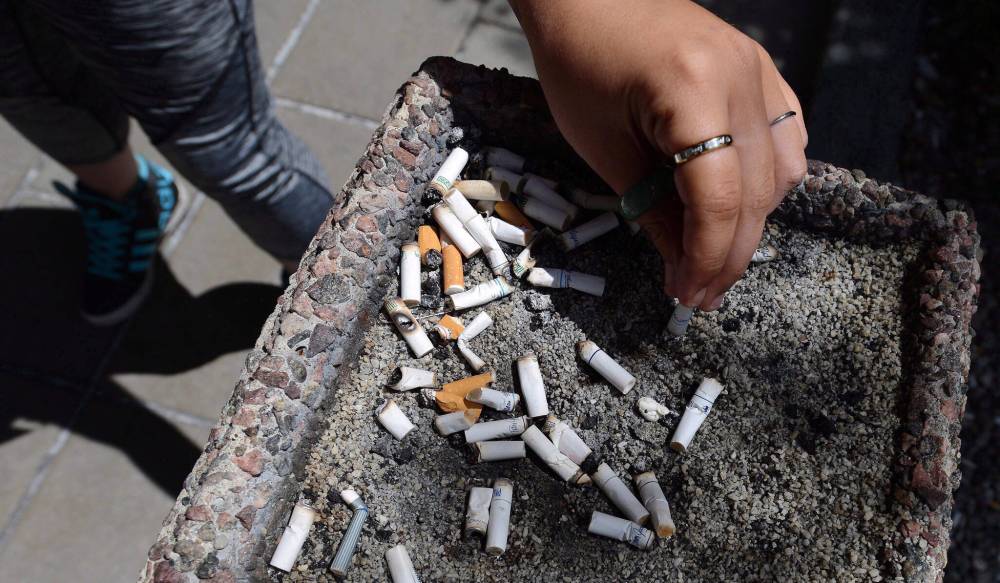Manitoba urged to use Big Tobacco cash to combat youth addiction
Read this article for free:
or
Already have an account? Log in here »
To continue reading, please subscribe:
Monthly Digital Subscription
$0 for the first 4 weeks*
- Enjoy unlimited reading on winnipegfreepress.com
- Read the E-Edition, our digital replica newspaper
- Access News Break, our award-winning app
- Play interactive puzzles
*No charge for 4 weeks then price increases to the regular rate of $19.95 plus GST every four weeks. Offer available to new and qualified returning subscribers only. Cancel any time.
Monthly Digital Subscription
$4.99/week*
- Enjoy unlimited reading on winnipegfreepress.com
- Read the E-Edition, our digital replica newspaper
- Access News Break, our award-winning app
- Play interactive puzzles
*Billed as $19.95 plus GST every four weeks. Cancel any time.
To continue reading, please subscribe:
Add Free Press access to your Brandon Sun subscription for only an additional
$1 for the first 4 weeks*
*Your next subscription payment will increase by $1.00 and you will be charged $16.99 plus GST for four weeks. After four weeks, your payment will increase to $23.99 plus GST every four weeks.
Read unlimited articles for free today:
or
Already have an account? Log in here »
A coalition is urging the Manitoba government to use some of its Big Tobacco settlement to set up a research and education foundation to prevent the next generation from being addicted to nicotine.
“We need to empower our kids and help them understand how dangerous nicotine is,” said epidemiologist Cynthia Carr, executive director of the Manitoba Tobacco Reduction Alliance.
Ahead of the start of the claims process, Manitoba should prepare to invest some of its estimated $1.1-billion settlement toward prevention efforts targeting youth, she said.
“Punitive approaches don’t work,” said Carr, who’s with the non-profit whose members include the Canadian Cancer Society, Manitoba Lung Association, University of Manitoba, Pharmacists Manitoba.
“Once you’re addicted to something or once you think what your friends are doing is cool, once you think that’s a social enabler and you’re suddenly popular and part of the crowd because you’re doing what everybody else is doing, the fear of punishment is not helpful, ” Carr said.
MIKE SUDOMA / FREE PRESS FILES Epidemiologist Cynthia Carr said she hopes the province sets aside enough — she suggested $25 million — for a foundation to nip nicotine addiction in the bud.
The Manitoba government is expected to receive $1.119 billion, including $281 million up front, minus legal fees, with the rest paid out from tobacco company profits over the next 20 years, as part of the historic $32.5 billion court-approved settlement in March.
In 2012, Manitoba joined other provinces in a lawsuit against Big Tobacco — Imperial Tobacco Canada Ltd., Rothmans, Benson & Hedges Inc., and JTI-Macdonald Corp., as well as their foreign parent companies — to recover the cost of providing health care for tobacco-related illnesses.
Premier Wab Kinew said last month that Manitoba’s settlement money is earmarked for a new CancerCare site.
“We’re going to invest every single dollar in curing cancer, in fighting cancer and supporting cancer patients every step of the way,” Kinew said while announcing a new $1-billion CancerCare building.
On Monday, Kinew was attending a premiers meeting in Ontario and wasn’t available to comment. His spokesperson said part of the settlement will be spent on prevention.
In 2012, Manitoba joined other provinces in a lawsuit against Big Tobacco to recover the cost of providing health care for tobacco-related illnesses.
Carr said she hopes the province sets aside enough — she suggested $25 million — for a foundation to nip nicotine addiction in the bud.
“The opportunity and the greater good is to take a portion of those monies and invest in prevention, education and empowerment, particularly of our young people, who are of course the targets of these companies that need your money to keep going.”
After the upfront disbursement to the Manitoba government, the balance of the settlement money is to be paid out in five-year increments, depending on the tobacco companies’ after-tax profits from tobacco sales.
Carr said that doesn’t include alternative nicotine products such as vapes “that are becoming more and more popular with kids for many reasons.”
The alliance said 26 per cent of youth in grades 10 to 12 and seven per cent of grades 7 to 9 use vaping products, which puts them at risk of nicotine addiction and future tobacco use.
The epidemiologist said she’s concerned youth will be at an even greater risk for target marketing of nicotine vapes and pouches.
The $32.5-billion settlement includes nearly $25 billion for provincial and territorial governments.
It also covers more than $4 billion for members of a Quebec class-action lawsuit, and more than $2.5 billion for smokers in other provinces and territories who were diagnosed with lung cancer, throat cancer or chronic obstructive pulmonary disease from March 2015 to March 2019.
Another $1 billion was set aside to establish the Cy-près Foundation to fund research, programs and initiatives focused on improving outcomes in tobacco-related diseases.
“It’s not focused on prevention,” Carr said, adding the province could establish a legacy foundation to encourage investment in research, innovation and expertise in Manitoba.
“It’s a tiny investment… that will make a massive difference.”
carol.sanders@freepress.mb.ca

Carol Sanders
Legislature reporter
Carol Sanders is a reporter at the Free Press legislature bureau. The former general assignment reporter and copy editor joined the paper in 1997. Read more about Carol.
Every piece of reporting Carol produces is reviewed by an editing team before it is posted online or published in print — part of the Free Press‘s tradition, since 1872, of producing reliable independent journalism. Read more about Free Press’s history and mandate, and learn how our newsroom operates.
Our newsroom depends on a growing audience of readers to power our journalism. If you are not a paid reader, please consider becoming a subscriber.
Our newsroom depends on its audience of readers to power our journalism. Thank you for your support.






